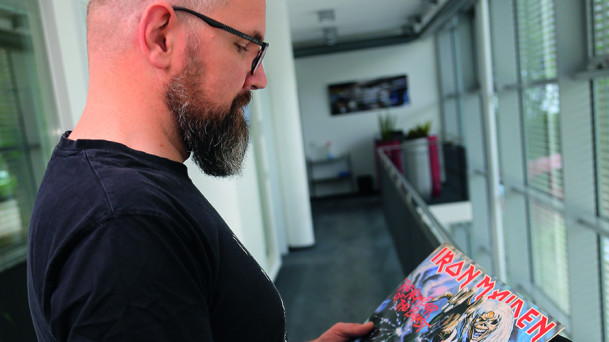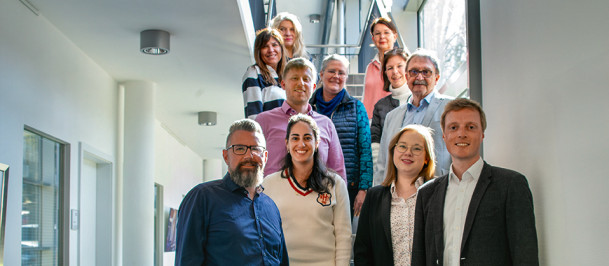Legal Popstars
The juridical world is not a fancy song contest. But if it was, KKP.law would be among the top stars. On a visit to a Wetzlar law firm where they apparently do some things differently and many things right.
Due: an appointment with the lawyers. More precisely: with KPP in Wetzlar. We are still busy sorting our clichés about lawyers into the familiar pigeonholes while waiting in the foyer, when we are greeted by Christian Koch: tall, distinctive glasses, undercut, trimmed beard, with rings on more than just one ring finger. As a welcome, we get some popcorn – served in a branded cardboard container with the inscription in capital letters: “Legal Popstar“.
Spelled out the classical way, the name of the law firm is Kleymann, Karpenstein & Partner. For about two years now, they have been operating under the brand name KKP.law. Since 2017, Christian Koch has been a partner of the law firm, in addition to Martin Hauter and Linda Lewis. That the specialized lawyer does not meet the common cliché of a jurist is immediately apparent and gets confirmed during our conversation. “Where we are concerned, it is not about being forced to be something else but to be just the way one is,” he says. And this principle does not only apply to him but to everybody. Pleasantly different, that is what characterizes the roughly 15 colleagues in the law office, too. The proportion of women reaches more than 60%. The consulting expertise of the medium-sized law firm specialized in business and commercial law ranges from trademark and design rights to licensing rights, from copyright and data protection to industrial laws as well as to environmental laws, planning acts, and public procurement laws.
A broad juridical competence under one umbrella
“With specialized experts for specific areas, we are quite diversified,” Christian Koch explains. “Our job profile has changed. The all-rounder who covers everything has become rare. It has nothing to do with lawyers being less well qualified nowadays but with the fact that juridical subject areas have gotten more and more complex.” Having such a broad juridical competence under one umbrella turns out to be of great advantage in practice. “The other day, for example, a client came to us who wanted to draft an in-house agreement for implementing AI in the company,” Koch relates. “The subject spans from copyright and media law well into the sector labor and employment law. Those are jobs which we solve in a team with our respective specialized lawyers.”

Christian Koch, specialist lawyer and partner at KKP.law, cultivates both his profession and passion.
For him, approaching and interacting with clients are most crucial, Christian Koch emphasizes: “No matter if we are facing an existing client or a new client – two questions have priority for us: What do you need? What can we do for you?” He himself is a specialized lawyer for information technology law as well as copyright and media law. For his clients, he is able to do a lot. Because the development of data-based technologies in products and processes is playing a more and more important role in the companies.
Ideas and innovations are certainly distinct competitive advantages for any enterprise. But they will quickly become detrimental if they are stolen or copied by others. Therefore, it is necessary to safeguard against it in line with the copyright law. Ensuring that companies are operating within a legal framework affects the drafting of a contract and the delivery agreements, the documentation as well as the communication. The regulations to that effect are laid down in the General Data Protection Regulation (GDPR) or the “Principles for Properly Keeping and Storing Books, Records and Documents in Electronic Form and for Data Access” (GoBD) by the German fiscal authorities. Admittedly: This is exactly as complicated as it sounds. The subject matter experts of KKP.law make sure to develop a solution from all of this which will prove to be both efficient and reliable for a company when put into practice.
Specialized lawyers indispensable as “human” competence centers
Considering the complexity of the framework of laws and regulations, it is surely not easy to stay informed about the most recent updates. In particular with regard to technological subjects, where one does not only need to understand the legal situation but above all the technology itself. The biggest challenge is that both develop rapidly. Prominent example: AI. Everybody thinks they may use it for their owned purposes (and would be allowed to do so). The spectrum ranges from the utilization of the respective AI Apps on a smartphone in everyday work to the application of AI for the control and automation of products and processes in the company. On February 1st of this year, the first level of the European Union’s Artificial Intelligence Act came into effect. In addition to a ban of AI in especially sensitive fields of application, the Act also demands an “AI competency” intended to promote an awareness of the opportunities, risks, and possible damages in connection with AI. “Exactly for this purpose, we developed an online proof of competency called KIKONA in collaboration with a partner,” Christian Koch tells us. “It is an uncomplicated, time-saving, and cost-efficient solution for obtaining AI competency with a certificate for documentation.”
As a representative of a profession which Christian Koch attests of having a habitual “tendency of being naysayers”, in case of doubt, he will always advocate for that what’s new. “As far as I’m concerned, I am very open to all types of technologies but there are many people who have reservations and are cautious. My opinion is: If caution prevents us from improving, it is not helpful.” A notion, that Christian Koch conveys both to his clients and to his teams at KKP.law. But he is also convinced that specialized lawyers are indispensable as “human” competence centers in order to evaluate things, facts, and circumstances. “There is one thing,” Christian Koch is certain, “that technology is definitively not able to do: to inspire confidence in the clients through direct exchange in order to cooperatively achieve the best results. This is what clients appreciate in the end when working with KKP.law.”
www.kkp.law
KKP.law
In 1990, the law firm Kleymann, Karpenstein & Partner came about from a merger of the law offices of Horst Kleymann (operating in Wetzlar since 1966) and Hans Karpenstein (founded in Lahnau in 1976). Since 2023, the law firm has been operating under the brand KKP.law. The law firm employs about 15 people. Their clients include in particular medium-sized companies, communal administrations, and the creative industry.
